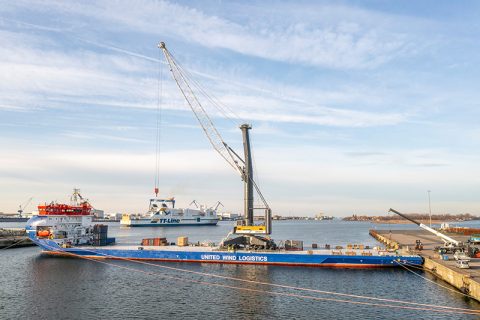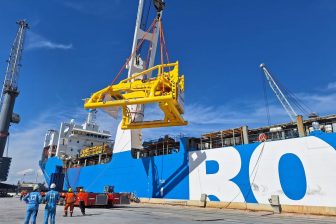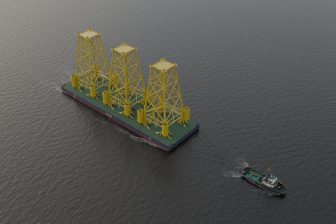
LHM 800 delivered to Marcor Stevedoring
Mobile harbour crane of type LHM 800 has arrived at Marcor’s Hartel Terminal to serve as a logistical bridge between the port’s quay and storage warehouses for dry bulk cargo. It is the company’s first Liebherr LHM 800e crane, featuring a 64-metre reach and a peak capacity exceeding 2,000 tons per hour.
The addition of the new LHM 800 is a significant step towards the strategic expansion of the terminal. The focus is to operate more sustainably by using renewable energy and cleaner drive concepts. Another LHM 800 has also been ordered and will be shipped to Marcor later this year. The Hartel Terminal, which covers an area of 130,000 square metres, has a 600-metre quay with a 16-metre draft alongside. It can handle vessels ranging from barges to 120,000 DWT baby-cape vessels for board-to-board transshipment or discharge to/from the terminal.
Keeping up with logistical capacity demands
The expansion of the green infrastructure sector necessitates a corresponding enhancement in logistics capabilities. Marcor specializes in handling various dry bulk commodities such as agri-bulk, biomass, concentrates, ores, industrial minerals, jumbo bags, and other bulk materials, offering services in discharge, loading, storage, treatment, and ship-to-ship operations.
The market’s size and growth prospects are substantial both regionally and globally. Notably, the Port of Rotterdam witnessed a throughput of around 64 million metric tonnes of dry bulk cargo in 2023. In 2022, the EU’s per capita consumption of raw materials, including biomass, metal ores, non-metallic minerals, and fossil energy materials, amounted to nearly 14.83 metric tonnes.
The European mineral raw materials industry experienced a significant upsurge in the production of minerals essential for clean energy technologies, as highlighted in a World Bank report. The surge is primarily driven by the demand for minerals and metals crucial for the implementation of renewable energy strategies and associated infrastructure, such as copper, lithium, nickel, cobalt, graphite, among others.
“With the LHM 800, we have gained a competitive edge in the dry bulk market,” comments Danny Swart, Director of Marcor Stevedoring. “It is a versatile and powerful machine that can handle any type of cargo, from ore to grains and fertilizers. It also reduces our fuel consumption and emissions, which is in line with our sustainability goals.”
You just read one of our premium articles free of charge
Register now to keep reading premium articles.




